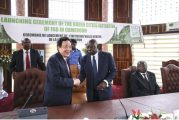Categories
Recent Posts
- Biya regime delays bond sale amid regional market strain
- Historic agreement between Nigeria and Cameroon to tackle wildlife crime
- Southern Cameroons refugees in Nigeria receive farm seedlings
- Douala: Investment Forum wraps up with honors for investment champions
- Understanding the Biya Francophone regime’s support for the Israeli genocide in Gaza
Archives
- April 2024
- March 2024
- February 2024
- January 2024
- December 2023
- November 2023
- October 2023
- September 2023
- August 2023
- July 2023
- June 2023
- May 2023
- April 2023
- March 2023
- February 2023
- January 2023
- December 2022
- November 2022
- October 2022
- September 2022
- August 2022
- July 2022
- June 2022
- May 2022
- April 2022
- March 2022
- February 2022
- January 2022
- December 2021
- November 2021
- October 2021
- September 2021
- August 2021
- July 2021
- June 2021
- May 2021
- April 2021
- March 2021
- February 2021
- January 2021
- December 2020
- November 2020
- October 2020
- September 2020
- August 2020
- July 2020
- June 2020
- May 2020
- April 2020
- March 2020
- February 2020
- January 2020
- December 2019
- November 2019
- October 2019
- September 2019
- August 2019
- July 2019
- June 2019
- May 2019
- April 2019
- March 2019
- February 2019
- January 2019
- December 2018
- November 2018
- October 2018
- September 2018
- August 2018
- July 2018
- June 2018
- May 2018
- April 2018
- March 2018
- February 2018
- January 2018
- December 2017
- November 2017
- October 2017
- September 2017
- August 2017
- July 2017
- June 2017
- May 2017
- April 2017
- March 2017
- February 2017
- January 2017
- December 2016
- November 2016
- October 2016
- September 2016
- August 2016
- July 2016
- June 2016
Featured
 Understanding the Biya Francophone regime’s support for the Israeli genocide in Gaza
Understanding the Biya Francophone regime’s support for the Israeli genocide in Gaza  Poverty under Biya: Cameroonians embrace Chinese language for brighter futures
Poverty under Biya: Cameroonians embrace Chinese language for brighter futures  Cameroon is broken: Who can fix it?
Cameroon is broken: Who can fix it?  Ethiopia: U.S Senator Cardin Statement on the Killing of Bate Urgessa
Ethiopia: U.S Senator Cardin Statement on the Killing of Bate Urgessa  Battle for the Unity Palace: ANNOUNCEMENT!
Battle for the Unity Palace: ANNOUNCEMENT!
Most Commented Posts
 4 Anglophone detainees killed in Yaounde
4 Anglophone detainees killed in Yaounde
19 comments Chantal Biya says she will return to Cameroon if General Ivo Yenwo, Martin Belinga Eboutou and Ferdinand Ngoh Ngoh are sacked
Chantal Biya says she will return to Cameroon if General Ivo Yenwo, Martin Belinga Eboutou and Ferdinand Ngoh Ngoh are sacked
13 comments Anglophone Nationalism: Barrister Eyambe says “hidden plans are at work”
Anglophone Nationalism: Barrister Eyambe says “hidden plans are at work”
12 comments The Anglophone Problem – When Facts don’t Lie
The Anglophone Problem – When Facts don’t Lie
12 comments Largest wave of arrest by BIR in Bamenda
Largest wave of arrest by BIR in Bamenda
10 comments
Latest Tweets
Featured
-

Biya regime delays bond sale amid regional market strain
-

Historic agreement between Nigeria and Cameroon to tackle wildlife crime
-

Southern Cameroons refugees in Nigeria receive farm seedlings
-

Douala: Investment Forum wraps up with honors for investment champions
-

Understanding the Biya Francophone regime’s support for the Israeli genocide in Gaza
-

US: Prosecution lays out ‘criminal conspiracy’ as Trump’s hush money trial opens
-

FAO formally launches Green Cities Initiative in Cameroon
© Cameroon Concord News 2024
13, January 2022
CPDM Crime Syndicate: Another General Manager in Kondengui 0
He is accused of financial misappropriation by the so-called Special Criminal Court. The French Cameroun political elite has been held in pre-trial detention since January 5 at the Kondengui Maximum Security Prison.
This week in Yaounde, pro Biya state prosecutors questioned Jean Claude Atanga Bikoe the general manager of a CPDM creation known as Road Fund dedicated to the financing of road maintenance and direct payment to private companies for services provided under contracts awarded after competitive bidding.
Cameroon Intelligence Report correspondent covering the Special Criminal Court reported that Jean Claude Atanga Bikoe was arrested on the basis of several damning reports which is still to reveal the exact amount stolen by the GM.
The pro Biya regime judges also accused the former GM of complicity in the misappropriation of public property, forgery and use of forgeries in public writing, in the context of the financial management of the Road Fund.
The presidential decree that created the Road Fund as a public administrative establishment in 1996 stipulates that its general manager ensures its daily management by collecting and transferring financial resources into the Fund’s bank accounts or public treasury. Hon. Jean Claude Atanga Bikoe was installed at the head of the Road Fund in 2012.
Jean Claude Atanga Bikoe’s arrest comes in the wake of the presidential speech at the end of the year. The 88-year old Paul Biya announced, among other things, the resumption of the fight against misappropriation of public funds.
Depicting the Special Criminal Court established to prosecute alleged corrupt government officials and the several Alibabas responsible for pilfering from the public treasury as President Biya’s court is no misnomer. Cameroon Concord News Group calls it the President’s court because it is one instrument of power through which Biya is reining in on perceived opponents from within his CPDM power conduit.
An attribute of a genuine court is the fairness of the trial proceedings in cases which are brought before the court for trial. It is not the number of convictions entered against accused. A court is legitimate and recognized as such because of its exercise of judicial, executive, legislative and administrative independence. A court that is independent must be accessible to all citizens after all, is equality before the law, not a constitutionally protected value? The Special Criminal Court is lacking in these attributes of impartiality, judicial independence and accessibility. It is perceived more as President Biya’s Court than a Court of Justice.
Establishing this court was President Biya’s way of saving himself the embarrassment of being humiliated during his perennial trips abroad as the President of the most corrupt country in the world. This ranking of the country as the most corrupt or one of the most corrupt countries had a potential to hamper President Biya’s personal pecuniary interests far from the borders of Cameroon. There was therefore a personal interest need to establish the court. Another personal interest need was to avail himself of a legal tool under his direct control to consolidate absolute power, blackmail potential rebels and competitors within the system and to stifle any form of institutional opposition. He perceived the court as a tool with which to whitewash his more than thirty-eight years of corrupt governance and the rape of the economy.
With the war against Boko Haram and the war in Southern Cameroons, the fight against corruption using the Special Criminal Court has afforded Paul Biya justification contest in the next institutionally flawed elections in order to eternalize power purportedly to direct the war against so-called terror and the war against corruption. True to the name the President’s Court, the President has exclusive preserve in referring cases to the Special Court and the power to terminate them. He decides who will be arrested, who will be investigated and who will serve time and who will not.
In one instance, he ordered a detained late Minister Bapes Bapes released from remand custody at Kondengui when a warrant was issued for his arrest without the presidential fiat.
By Soter Tarh Agbaw-Ebai with files from Rita Akana